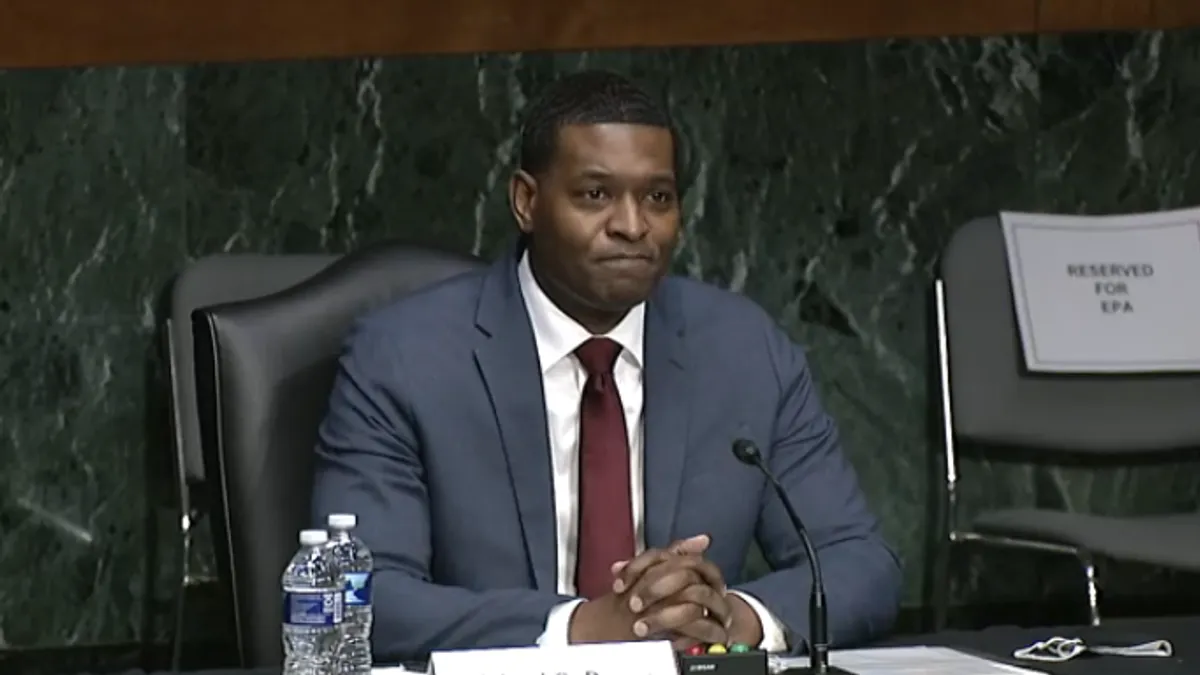UPDATE: March 11, 2021: The Senate on Wednesday confirmed Michael Regan as head of the Environmental Protection Agency in a 66-34 vote, with all Democrats and 16 Republicans voting in his favor.
Dive Brief:
-
President Joe Biden's pick to serve as administrator of the U.S. Environmental Protection Agency (EPA) pledged to take a "clean slate" approach when determining how to take on the Clean Power Plan versus the Affordable Clean Energy Act — regulations under the Obama and Trump administrations, respectively, aimed at addressing carbon emissions from fossil fuel-fired power plants.
- Michael Regan promised to work cooperatively with states and local communities, and said under his watch protecting the environment would not come "solely from regulation."
-
Republican senators grilled Regan over a spate of actions and appointments Biden has made on climate in the past few weeks, pressing him on whether he was committed to protecting fossil fuel communities from major economic fallout.
Dive Insight:
President Biden signed a number of executive orders within weeks of taking office, including on ending fossil fuel subsidies, rejoining the Paris climate agreement, suspending new oil and gas leases on public lands, and reviewing royalties for gas, oil and coal production.
Senators from fossil fuel producing states in particular asked Regan to defend the president's actions, questioning whether they were sound policies, given potential job losses in the fossil fuel sector.
"I am concerned that this is shaping up to be a third Obama administration," said Sen. Shelley Moore Capito, R-WV, who served as temporary chair of the U.S. Senate Committee on Environment and Public Works during Regan's hearing. She and other senators expressed particular concern over Biden's appointment of Gina McCarthy and John Kerry as the White House National Climate Advisor and Special Presidential Envoy for Climate, respectively, pressing Regan over how their authority might conflict with the EPA administrator's position.
Regan pledged to work cooperatively with states and local communities. He argued that Biden's vision would create economic opportunities and that establishing clean energy industries in the U.S. is crucial in maintaining global leadership on climate change.
"I see the executive orders as setting goals and setting [a] vision," said Regan. "But in those executive orders, they leave plenty of room for how these things will be implemented. ... And so we have a ton of time, in my opinion, to aim for these goals, but massage the processes by which we will achieve those goals."
Regan, who formerly served as the secretary of North Carolina's Department of Environmental Quality, pledged to work closely with states and local communities on how best to implement EPA regulations. He said that his experience as a state regulator taught him that the uncertainty and back and forth litigation generated by the last two administrations was "very painful," and he promised to "apply those lessons learned" as administrator going forward.
Regan also said he would take a "clean slate" approach when determining how to take on the Clean Power Plan versus the Affordable Clean Energy rule.
One of the biggest political and regulatory footballs between the Obama and Trump administrations was the debate over how EPA should regulate greenhouse gas emissions. The Obama administration's Clean Power Plan would have required the power sector to cut carbon emissions a third below 2005 levels by 2030.
Such cuts would likely requiring generation shifting — moving away from coal and toward cleaner resources — as one of the best means of reducing emissions. The Affordable Clean Energy rule, acted as a replacement for the Obama regulation, with the Trump administration arguing that EPA could only regulate emissions at the source — and not compel a utility to change the kind of resources it uses to generate electricity.
Recently, the United States Court of Appeals for the D.C. Circuit ruled EPA's argument was flawed, and vacated Trump's Affordable Clean Energy rule, though the Supreme Court also issued a stay on the Clean Power Plan in 2016, making it unclear how far the Biden administration can go in regulating carbon emissions.
"The reality is that [reexamining both rules] presents a significant opportunity for the Environmental Protection Agency to take a clean slate and look at: 'How do we best move forward?'" Regan said. "There are lots and lots of, I would say, examples of success and failure that we've seen in past tries."
Democratic senators, meanwhile, asked Regan to commit to reexamining the role industry played in the Trump administration, which has been accused of catering to industry interests on coal ash regulations, power plant emissions, vehicle emissions and more.
"You will be coming into an agency that in my view was more or less captured by the fossil fuel industry," said Sen. Sheldon Whitehouse, D-RI, adding "I think this is a particularly flagrant example that we witnessed of agency capture. And I think it left a trail of damage to the institution."
Broadly, senators across the aisle seemed supportive of Regan's nomination, with Republicans and Democrats remarking on the support he's received from stakeholders, as well as his reputation of listening to a wide array of input.
"We can't imagine as Republicans that we're necessarily going to have a president with the same priorities as ours," said Sen. Thom Tillis, R-NC, "but what we can hope for are people in the administration who have a track record of listening and trying to come up with a sustainable outcome … [Regan] will sometimes take on initiatives that I will disagree with, [and] most likely vote against. But I do believe that he will be somebody that we can rely on to be fair."













